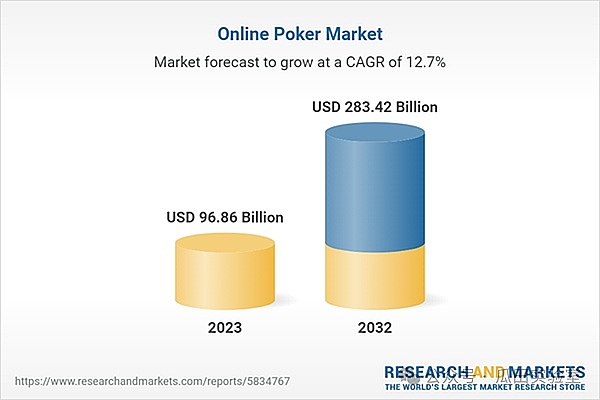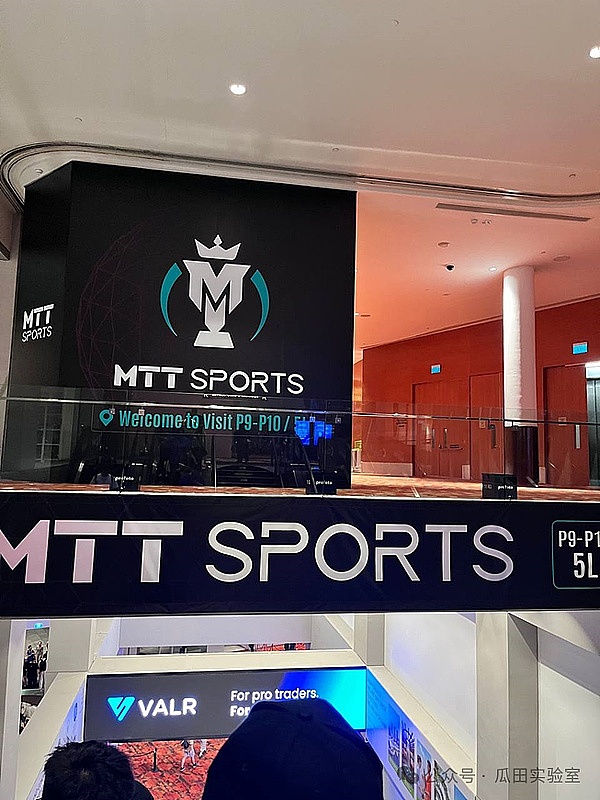I recently read a 100-page report written by Research And Markets.com last year, which analyzed the current status and future development of the online poker market. The report predicts that by 2032, the global online poker market will reach 283.4 billion US dollars, while the current market size is about 96.8 billion US dollars.

Texas Hold'em is the largest part of online poker competition. There are other games like Omaha, which are not comparable to Texas Hold'em in scale. Therefore, this article takes online Texas Hold'em as an example to specifically analyze the necessity and practical cases of combining competitive online poker tracks with WEB3. Online Texas Hold'em is further divided into two categories: cash table and tournament. Cash table is the kind of game that people often play at offline gatherings, where you can buy in multiple times. At present, cash table Texas Hold'em is mostly classified as gambling in the international community, while tournament-type Texas Hold'em has been classified as an e-sports competition type by many countries and regions, such as Germany, the United Kingdom, Switzerland, several states in the United States, etc. Taiwan in Southeast Asia has also clearly enacted laws to support Texas Hold'em tournaments as an e-sports project.
To be honest, I have been playing Texas Hold'em for more than ten years. I am a casual player who is not very addicted to it. Fortunately, I have done a lot of theoretical research. I bought several books to take notes, and I never get tired of watching various Texas Hold'em videos. However, I really didn't expect that online Texas Hold'em is still a business worth hundreds of billions. After entering the crypto circle, I found that the proportion of friends playing Texas Hold'em in this circle is no less than that in the financial circle. There are several reasons:
First, although Texas Hold'em emphasizes technology and psychology, its underlying gambling nature and luck are also the fundamental factors that attract players;
Second, those who can stay in the circle for a long time are either proficient in numbers or social maniacs, and Texas Hold'em is most suitable for these two types of people;
Third, crypto people are bored facing computers every day, and having an easy-to-play online game as a social tool to connect with others plays a role in increasing emotional value.
Therefore, the user profile of the crypto circle and the player attributes of Texas Hold'em can be highly overlapped. It is no wonder that after we have been exposed to the WEB3 Texas Hold'em circle more, we magically discovered that those top players who often appear in high-stakes cash tables such as WPTpoker or Huslter, it turns out that their main job is to be the bigwigs in the crypto circle...
If it is just that the users of the two circles match in characteristics, this narrative is not sexy enough to allow W Labs to continue researching "crypto + online Texas Hold'em" for so long. Old friends of W Labs should know that in our second 10,000-word investment research article in 2022, "The Future of Gamefi's Chain Game Economic Model" (https://mirror.xyz/0x5c15d8bE6A1dcb715d998d60ed06732f71DCf432/PZscW7w1sbaOdXRUriLYZy8NZKYHH9cb8alShek4Lyc), we specifically used Texas Hold'em as an example to explain what kind of games are suitable for chain games. Looking back at this article now, it only argues that blockchain games should be similar to Texas Hold'em based on the game rules of "easy to get started + thrilling step by step", but it does not analyze it in combination with the characteristics of blockchain itself: If the main characteristics of blockchain are integrated into online Texas Hold'em, will it bring about a fundamental improvement in certain aspects of the original industry?
W Labs partner Huige wrote an article at the end of 2022, "Comparative Analysis of Texas Hold'em GameFi Games"
(https://mirror.xyz/0x5c15d8bE6A1dcb715d998d60ed06732f71DCf432/PbYqPxB7EuRBs3AGuVxIokA8KmgtyZ2QFAYoDUxxEM4 ), which mentioned some changes that blockchain technology may make to online Texas Hold'em. At that time, the reason why we wrote this article was actually a by-product of providing economic model consulting services to a WEB3 Texas Hold'em project. We simply wrote down some of our thoughts and ideas. The article briefly mentioned the convenience of payment and the transparency of card issuance, which can be improved with blockchain technology. Two years have passed in a blink of an eye, and it is gratifying that some of these points are already being developed and verified.
Two years have passed, the WEB3 industry has experienced ups and downs, and practitioners have separated and reunited. After experiencing the helpless sigh of "it's all bubbles",we are more focused on studying those projects that may use the characteristics of blockchain itself to change a certain WEB2industry or product. Even a little change is more reassuring than the Ponzi model of "I know it will definitely collapse, I just believe that I can run faster than others".So in the current sluggish market, we picked out some tracks or products, focused on tracking and analysis, hoping to see their long-term development in the future, and the online Texas Hold'em track was the first target we picked out.
(I) How blockchain technology changes online Texas Hold'em
Blockchain technology can completely fill in some of the current pain points of the online Texas Hold'em track. This is already a consensus among many teams engaged in blockchain Texas Hold'em. Let's explain it systematically.
1.1 How to prove that there is no cheating in the card dealing: transparency of card dealing
I remember when I started playing online Texas Hold'em a long time ago, an old classmate who was running an online Texas Hold'em private bureau at the time kindly advised me: Don't play big online, the cards can be adjusted at will. Think about it, the centralized card dealing process can be adjusted at will by the platform's own scientists. So later, when I felt like playing, I only played small games on Pokerstars, because Pokerstars is the largest in the world, and it doesn't have to do evil for you small investors, but it still has the ability to do evil! This is just like the centralized institutions in the crypto circle, which have always been balancing their brand value and the benefits of doing evil. For example, if you have deposited tens of billions of U in a certain security, when a certain security has cash flow problems, would you not want to do some small tricks to embezzle some of your funds for emergency? Don't challenge human nature.
If the cards are dealt randomly using the protocol, and recorded on the unalterable blockchain at the same time, and everyone confirms that these records have not been manipulated through zero-knowledge proof ZKP (Zero-Knowledge Proof), then the transparency of Texas card dealing will be perfectly solved. Zero-knowledge proof is a powerful concept in cryptography. Academician Yao Qizhi of Tsinghua Yao Class is an expert in this field. It means that the authenticity of something can be proved in some way without revealing any specific information about the thing.
Some people say that some excellent online Texas Hold'em games now use the random number generator RNG (Random Number Generator) mechanism instead of a simple card distribution mechanism. Doesn't this ensure the fairness of the cards? I am a layman in technology, so I humbly consulted some code experts. The conclusion is: RNG also has different levels of design, and it is still under centralized control. Even if the RNG process itself is fine, the exit and entrance will still be controlled by humans. Therefore, if RNG is regarded as "anti-cheating system V1", the ZKP + RNG mechanism of blockchain can be called "anti-cheating system V2".
How to embed zero-knowledge proof into the Texas Hold'em card distribution system without affecting the smoothness of the card distribution and the player experience? Different teams have been developing it in the past two years, which is very expensive. But I think this is the most basic point that blockchain technology can change the online Texas Hold'em track. With this point, other points can be added.
1.2 How to prevent collusion and account swiping: fairness of players
It is impossible to completely solve the problem of collusion and account swiping in online Texas Hold'em, as human greed is endless. What the project can do is: Continuously increase the cost of cheating and account swiping without affecting the gaming experience of regular players as much as possible.
The WEB3 Texas Hold’em projects we have played have various ways to deal with partners and number brushing, which are mainly reflected in the rules. For example, some projects have cash tables, and only the administrator sends links to invited members, and the link becomes invalid after one entry; for example, MTT Sports, which has the largest reward now (this time it held a big event on Singapore token2049, because the official competition started in October, 1 BTC is given as a bonus every week, a total of 100 BTC is waiting for global Texas Hold’em masters to come), gave up the cash table business model and only did competitive competitions, and high-level competitive competitions must require a higher level of identity authentication, and need to show their faces to verify their identities. At the same time, players will be asked to change tables randomly during the competition.

Blockchain technology improves this area by being able to determine which numbers are partner cards or small numbers within a certain range based on the big data of players recorded in the blockchain, and then make a decision. Players can appeal if they are dissatisfied, because the previous actions are recorded on the chain anyway.
1.3 How to protect the security of funds: decentralized wallets
If Texas Hold'em players still remember how Full Tilt Poker, which was once popular more than a decade ago, went bankrupt, they should all support the introduction of blockchain decentralized wallets.

Full Tilt Poker was second only to Pokerstars more than a decade ago. Even the poker god Ivey supported it. However, the centralized system made the team lose the players' deposits of 400 million US dollars to only 60 million US dollars. Many people lost everything.
This kind of thing is actually too common in the crypto circle. The FTX incident is a replica of Full Tilt Poker. If you can use a decentralized wallet to log in to online Texas Hold'em, the main assets are placed in a decentralized wallet, and the project party has no right to call the assets in it, and only a small amount of funds are placed in the centralized account of the project to lubricate the game process, even if the project runs away, most of the assets are still in their own wallets.
1.4 Convenience of circulation and payment: automatic settlement of cross-border contracts
A long time ago, when playing Pokerstars, you could only find sellers on Taobao to recharge on your behalf. This strange business model exists because of the obstruction of circulation. What if there is no Taobao in a certain area? The last benefit that blockchain brings to online Texas Hold'em is that entry chips can be obtained as long as there is an Internet, and the rewards obtained are automatically settled through contracts embedded in the game rules. If you want to cash out, you can do it through the WEB3 withdrawal channel.
In this article, we summarize how blockchain changes several native features of WEB2 "Online Texas Hold'em", which can directly hit the pain points, which are the pain points that users suffer from but have to be accepted by WEB2 online Texas Hold'em projects PUA. Only when such projects combine blockchain technology to produce chemical reactions can the team itself, investors, and users establish a slightly longer-term basic consensus: This project is at least trying to change some existing unreasonable phenomena. In the next article, we have prepared some actual WEB3 Texas Hold'em project cases to discuss in detail.
To be continued.
【Disclaimer】
The information in this material is derived from public information or other information that we believe to be reasonable and reliable. Guatian Lab does not make any express or implied guarantees of its accuracy, adequacy, completeness, and appropriateness of its use.
The information, introduction, data, etc. in this material are for readers' reference only. Under no circumstances should any content of this material be regarded as any invitation or recommendation, and does not constitute investment advice. Various risks that may be faced by investment-related project assets (including but not limited to: investment risk, management risk, legal risk, tax risk, liquidity risk, credit risk, policy risk, economic cycle risk, interest rate risk, operational risk, risks caused by force majeure, etc.) shall be borne by the investors themselves. Guatian Laboratory and/or its affiliates shall not bear any legal responsibility for any consequences caused by relying on or using this material.
Without the written consent of Guatian Laboratory, no organization or individual may copy, disseminate or modify the content of this material in any form.
 JinseFinance
JinseFinance








